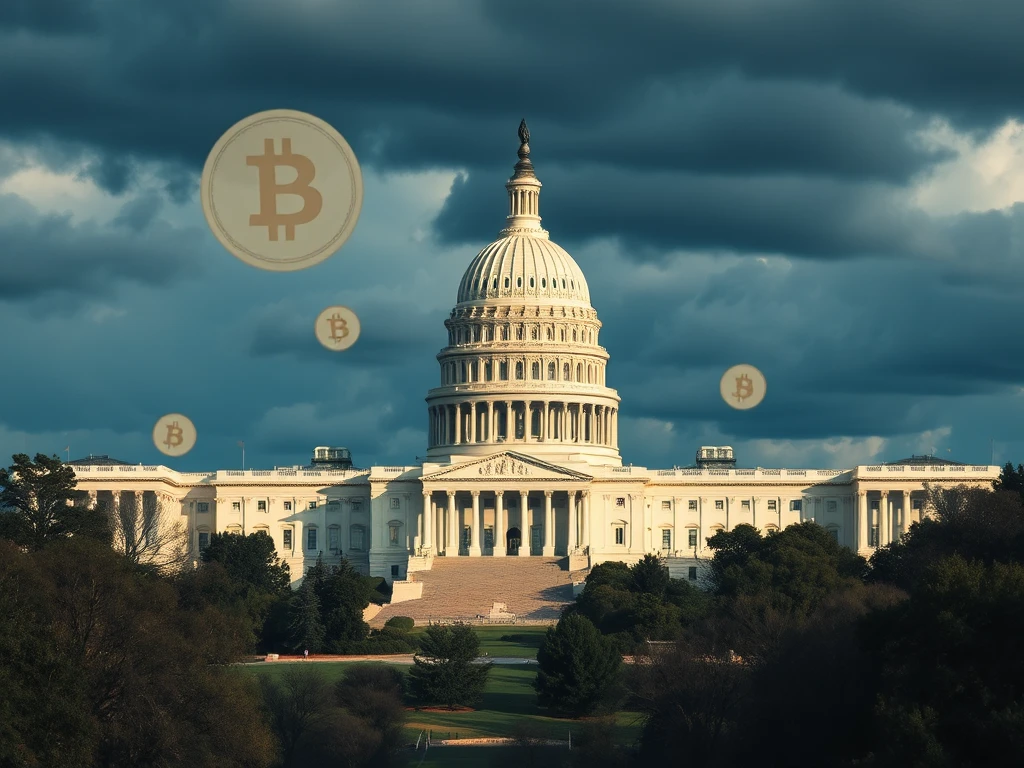US Stablecoin Bill Faces Urgent Threat Amid Trump Crypto Corruption Fears

The path for cryptocurrency legislation in the United States just hit a major roadblock. Democrats, who previously showed a willingness to work across the aisle on key crypto bills, are now pulling back their support. This sudden shift is creating significant uncertainty, particularly for the crucial **US stablecoin bill**, and appears linked to growing concerns about corruption, specifically involving former President Donald Trump and his family’s crypto ventures.
Why is the **US Stablecoin Bill** Facing Such Opposition?
Earlier this year, a bill aimed at regulating stablecoins in the US, known as the GENIUS Act, seemed to be making progress. It even passed a key Senate committee vote with unexpected support from several Democratic Senators. However, despite amendments intended to strengthen the bill with provisions for anti-money laundering (AML), counter-terrorism financing, and risk management, many Democrats now feel it doesn’t go far enough.
The withdrawal of support stems from heightened concerns about potential conflicts of interest and corruption within the crypto space, issues that have become more prominent alongside the activities of the Trump family’s World Liberty Financial (WLFI).
Concerns Over **Trump Crypto** Ventures
A major point of contention for Democrats is the involvement of Donald Trump and his family in various crypto projects. Critics argue that these ventures create a direct conflict of interest, especially as Congress attempts to legislate the very industry Trump is profiting from.
- Representative Maxine Waters has been particularly vocal, calling Trump’s TRUMP memecoin the ‘worst of crypto’.
- She has specifically criticized the WLFI USD1 stablecoin project.
- Waters stated that she cannot support a stablecoin bill that doesn’t prevent the President from owning such a business, warning other members against enabling this.
- Even some Republicans acknowledge that Trump’s crypto activities complicate the legislative process.
These concerns around **Trump crypto** activities are clearly impacting the willingness of Democrats to engage constructively on crypto legislation.
Democrats Raise Alarm on **Stablecoin Regulation**
The group of Democratic Senators who initially supported the GENIUS Act have now issued a statement outlining their continued reservations. While not explicitly naming Trump or corruption, their demands align with concerns raised about potential abuses and risks.
Their statement indicates that the bill still requires significant changes, including:
- Stronger anti-money laundering (AML) provisions.
- Clearer rules regarding foreign stablecoin issuers.
- Addressing national security implications.
- Ensuring the safety and soundness of the US financial system.
- Improved accountability measures for stablecoin issuers.
This insistence on stricter **stablecoin regulation** suggests that the current framework is viewed as inadequate to prevent potential exploitation or systemic risks, concerns amplified by recent events involving politically connected crypto projects.
Political Leverage or Genuine Concerns? The Role of **Democrats Crypto** Stance
While corruption fears are a stated reason for the shift, some observers suggest there might be political motivations at play. Aaron Brogan, a lawyer specializing in crypto regulation, finds it unlikely that the Senators’ concerns suddenly surfaced.
He proposes two alternative possibilities for the current **Democrats crypto** stance:
- **Political Leverage:** Democrats might be using their support for the bill as a bargaining chip on other legislative priorities. Reports suggest Senate Majority Leader Chuck Schumer has privately advised Democrats against committing to the bill for this reason.
- **Donor Influence:** Influential crypto donors or Political Action Committees (PACs) might prefer a different version of the bill or wish to delay it. Protect Progress, a crypto-supporting PAC, has donated significantly to some of the Senators now withdrawing support. Major industry players might be lobbying for a bill more aligned with their specific interests.
It’s challenging to definitively determine the primary driver behind the change in stance, but the outcome is clear: the path for bipartisan crypto legislation is becoming more difficult.
The Impact of **WLFI** on Legislative Efforts
World Liberty Financial (WLFI), the Trump family’s crypto firm, is central to the corruption concerns. The company has reportedly generated substantial revenue from token sales and continues to announce deals that benefit its founders and board members.
Key points regarding **WLFI** activities:
- Reportedly netted around $550 million from Trump token sales.
- Announced a deal for Abu Dhabi firm MGX to use WLFI’s USD1 stablecoin for a $2 billion investment in Binance.
- Tron founder Justin Sun became a major investor, reportedly spending nearly $70 million on TRUMP tokens.
- The SEC halted a civil fraud investigation into Justin Sun shortly after Trump took office, raising questions about timing and influence.
- A controversial invitation for top TRUMP tokenholders to attend a gala with the President fueled accusations of selling access.
Despite President Trump downplaying his involvement and denying profiting directly, the visibility and nature of WLFI’s activities have undeniably heightened scrutiny and fueled Democratic opposition to crypto legislation.
In conclusion, the withdrawal of Democratic support for the **US stablecoin bill** signals a significant challenge for crypto legislation in Washington. Driven by serious concerns about corruption, particularly linked to **Trump crypto** ventures and the activities of **WLFI**, and potentially influenced by political strategy, the bipartisan consensus needed for effective **stablecoin regulation** seems increasingly distant. The current political climate highlights the complex intersection of politics, finance, and the rapidly evolving world of cryptocurrency, leaving the future of US crypto policy uncertain.









